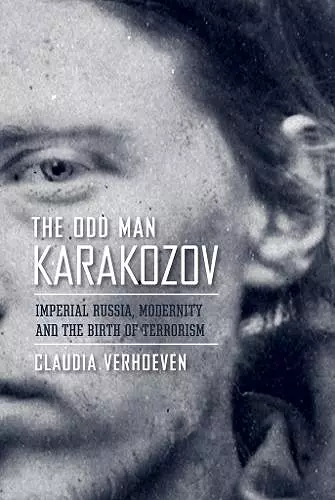The Odd Man Karakozov
Imperial Russia, Modernity, and the Birth of Terrorism
Format:Hardback
Publisher:Cornell University Press
Published:15th Apr '09
Currently unavailable, and unfortunately no date known when it will be back
This hardback is available in another edition too:
- Paperback£20.99(9780801477577)

On April 4, 1866, just as Alexander II stepped out of Saint Petersburg's Summer Garden and onto the boulevard, a young man named Dmitry Karakozov pulled out a pistol and shot at the tsar. He missed, but his "unheard-of act" changed the course of Russian history—and gave birth to the revolutionary political violence known as terrorism.
Based on clues pulled out of the pockets of Karakozov's peasant disguise, investigators concluded that there had been a conspiracy so extensive as to have sprawled across the entirety of the Russian empire and the European continent. Karakozov was said to have been a member of "The Organization," a socialist network at the center of which sat a secret cell of suicide-assassins: "Hell." It is still unclear how much of this "conspiracy" theory was actually true, but of the thirty-six defendants who stood accused during what was Russia's first modern political trial, all but a few were exiled to Siberia, and Karakozov himself was publicly hanged on September 3, 1866. Because Karakozov was decidedly strange, sick, and suicidal, his failed act of political violence has long been relegated to a footnote of Russian history.
In The Odd Man Karakozov, however, Claudia Verhoeven argues that it is precisely this neglected, exceptional case that sheds a new light on the origins of terrorism. The book not only demonstrates how the idea of terrorism first emerged from the reception of Karakozov's attack, but also, importantly, what was really at stake in this novel form of political violence, namely, the birth of a new, modern political subject. Along the way, in characterizing Karakozov's as an essentially modernist crime, Verhoeven traces how his act profoundly impacted Russian culture, including such touchstones as Repin's art and Dostoevsky's literature.
By looking at the history that produced Karakozov and, in turn, the history that Karakozov produced, Verhoeven shows terrorism as a phenomenon inextricably linked to the foundations of the modern world: capitalism, enlightened law and scientific reason, ideology, technology, new media, and above all, people's participation in politics and in the making of history.
The Odd Man Karakozov is a subtle, challenging, and imaginative work. It deserves to be widely read not just by students of modern Russian history but by all those interested in modern political violence and its interpenetration with forms of subjectivity, art, and mass culture.
-- Daniel Beer * Slavic Review *Verhoeven argues that modern terrorism began in nineteenth-century Russia... on April 4, 1866, [when] Dmitry Karakozov attempted to assassinate Czar Alexander II.... Verhoeven's thesis is comprehensive and thought provoking. She places the attempted assassination within the political context of social changes in Russia and other parts of Europe. She achieves this goal, incorporating the roles of Russian law, technological change, the emerging and competing media, and the advent of modernity. It is an outstanding analysis.
-- Jonathan R. White * The Historian *Verhoeven's careful inspection of Karakozov's failed assassination of Alexander II reads like an extremely well-researched detective story.
-- Lonny Harrison * Slavic and East European Journal *Verhoeven's powers of observation are formidable, her insights startlingly original, and her narrative masterfully staged on the level of the scene, the sentence, and the word.
-- Lynn Patyk * Russian ReviISBN: 9780801446528
Dimensions: 235mm x 155mm x 22mm
Weight: 907g
248 pages